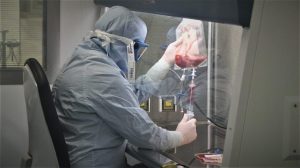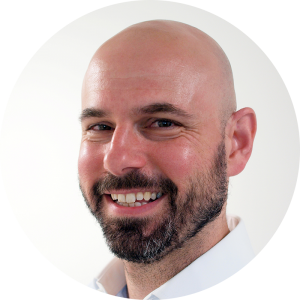
When specialist healthcare investment company Syncona Ltd discovered the ground-breaking cell therapy research being conducted by scientists at the University of Edinburgh it sparked a collaboration that went on to fuel the launch of pioneering biotechnology spinout Resolution Therapeutics.
A decade of dedication
Professor Stuart Forbes, Director of the Centre for Regenerative Medicine at the University of Edinburgh, has been exploring the role of macrophages in organ repair for over a decade. Macrophage cells are known primarily for their role in innate immunity, but studies had indicated they could also play a part in tissue repair. In collaboration with Professor John Campbell’s cell therapy group at the Scottish National Blood Transfusion Service (SNBTS), Professor Forbes and his team were not only able to discover the regenerative potential of macrophages, but also apply this learning to the development of novel treatments for chronic liver disease.
Syncona had identified the Forbes team’s research as a potential candidate for investment, so when their MATCH clinical trial data made a compelling case for the efficacy of macrophage cell therapy on chronic liver disease, the company funded a two-year research collaboration with Professor Forbes, his team and the SNBTS, with the aim of proving the commercial viability of macrophages as a treatment modality. Access to the University’s world-class facilities at the Centre for Regenerative Medicine in the Institute of Regeneration and Repair, which include a centralised cell culture facility and a state-of-the-art good manufacturing practice (GMP) cellular therapy facility, meant the team were ideally equipped to clear the path to manufacture and file several foundational patent applications. The success of the collaboration motivated Syncona to invest a further £26.6 million to form Resolution Therapeutics in 2020 and bring the team’s pioneering science to a clinical setting.
We are excited to partner with the world-class team in Edinburgh as together we build a business that will develop and commercialise macrophage cell therapies to treat severely ill patients who have no other treatment options. It is a very exciting opportunity, and we will be at the forefront of the development of a new kind of cell therapy“
Fighting liver disease
Resolution is initially channelling its leading-edge expertise into treating chronic liver disease, which is the only chronic disease still on the rise in western countries and the third leading cause of premature death in the UK. The lone therapeutic option currently open to patients with end-stage liver disease (cirrhosis) is liver transplantation, a complex surgical procedure inhibited by complications and a shortage of donors. There is a need for simpler, lower risk treatments with new modes of action.
In 2022 Resolution Therapeutics completed a £10 million financing extension from Syncona. The extended Series A funding will allow Resolution to continue to develop its autologous macrophage cell therapies while also broadening its research activity into the development of an allogeneic platform to produce “off-the-shelf” macrophage cell therapies.
Also in 2022, Resolution announced a research collaboration with private biotechnology company panCELLa, which makes cell lines incorporating therapeutic cell-focused Platform Technologies that are widely available for the treatment of degenerative, infectious and malignant diseases.
panCELLa is providing its hypo-immunogenic engineered iPSC technology to Resolution, which has an option to obtain commercial rights to use the panCELLa technology in the field of macrophage biology. Resolution will have access to panCELLa’s FailSafeTM and induced Allogeneic Cell Tolerance (iACT Stealth CellsTM) platforms, paving the way for Resolution to progress the development of its allogeneic macrophage programme, expanding the company’s pipeline with iPSC-derived macrophages.
Backed by Syncona and with panCELLa’s technology at hand, Resolution Therapeutics is harnessing the healing power of the macrophage to develop a novel and transformational therapeutic product that will effectively treat patients suffering from chronic liver disease and help them avoid the need for a transplant.
The University of Edinburgh continues to support Resolution Therapeutics as an engaged shareholder.
Read more about how Edinburgh Innovations manages positions in early-stage companies with OCC Holdings.

Find out how you can work with the University’s world-class inflammation expertise and state of the art facilities that will provide the solution to your research questions.